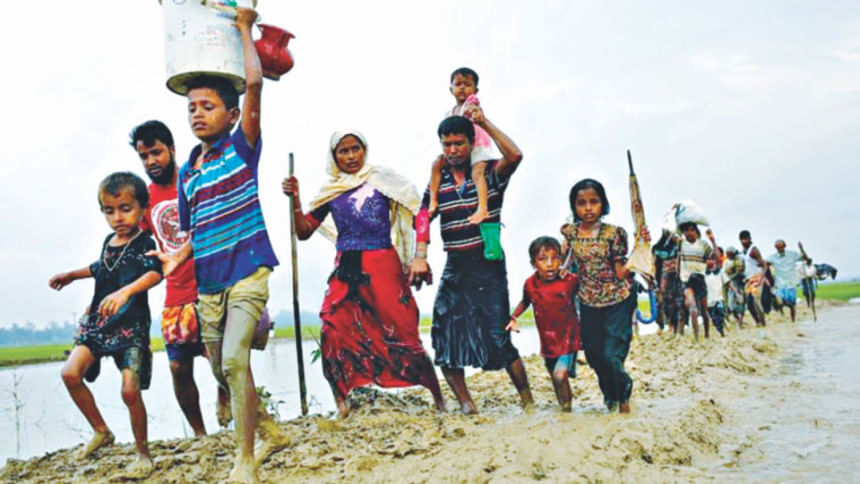Myanmar lawyer details crimes against Rohingyas in 2013 interview

Myanmar's legal counsel in an ongoing genocide trial at the International Court of Justice (ICJ) once compared the government's treatment of Rohingya Muslims to Nazi Germany's treatment of Jews during the Holocaust, according to a previously unreleased video footage of 2013 obtained and published by Fortify Rights today.
The government of Myanmar hired Prof William Schabas in 2019 to defend it at the ICJ against allegations of genocide of Rohingya Muslims.
"Prof Schabas's description of the situation of the Rohingya in 2013 was accurate, and the violations continued unabated for years, culminating in crimes of genocide in 2016 and 2017," said Matthew Smith, CEO of Fortify Rights.
"This footage is in the public interest. We decided to release it to demonstrate that Myanmar's narrative of the situation in Rakhine State is based on lies, which Professor Schabas himself helped to debunk in 2013."
The unedited video, filmed for the making of the 2013 Al Jazeera documentary "The Hidden Genocide," includes more than 21-minutes of an interview with Professor Schabas, who elaborates on the possible genocide of Rohingya, references Nazis three times, and characterizes the Myanmar government as a "tyrannical regime" with respect to its treatment of Rohingya.
In the interview, award-winning Al Jazeera journalist and filmmaker Phil Rees asks Professor Schabas to describe life for Rohingya in Myanmar in his own words, to which Professor Schabas replies: "It's analogous to some of the ghettos that existed for Jews in Nazi-occupied Europe. It did have the effect of isolating and of depriving people of fundamental rights, such as the right to free movement within a state, the right to leave the country, although people were able to get in and out illegally, of course, by crossing the border into Bangladesh. Indeed, that may have been one of the things that was hoped for all along."
In 2016 and 2017, the Myanmar Army led a campaign of massacres, mass rape, and mass arson, displacing more than 800,000 Rohingya men, women, and children to Bangladesh.
In November 2019, The Gambia filed a case at the ICJ in The Hague against Myanmar for failing to prevent or punish genocide against Rohingya.
During the case's third day of hearings on December 12, The Gambia's legal counsel highlighted a brief portion of the interview with Professor Schabas, which aired in "The Hidden Genocide."
In the film that aired, Professor Schabas said it was "not frivolous to envisage the use of the term genocide" with respect to Rohingya in Myanmar.
In response to The Gambia's argument, Prof Schabas attempted to distance himself from the claim, telling the judges that the "journalist from Al Jazeera" misrepresented the interview, adding that the "journalist persistently tried to get me to apply the word genocide to the situation in Myanmar."
He went on to say, "My views will be a lot clearer if we could get a copy of the tape of the entire interview."
Fortify Rights obtained the entire interview with Professor Schabas from Phil Rees, who maintains the rights to the footage and authorized its use.
In the footage, published in full today, Rees asks if "there might be a case to be made" that the Rohingya are facing genocide in Myanmar "in the very restricted definition of genocide," to which Professor Schabas responds, in part, that there may be "an arguable case that genocide is taking place in the situation like that confronting the Rohingyas in Burma [Myanmar]."
Continuing, Prof Schabas says: "And it's also important to point out that even if we're not in the context of a genocide that's underway, that many of the acts that surround what's going on are warning signs of genocide, are precursors, if you want, and this has to of course greatly heighten our concern, because, as we say the famous slogan "Never Again," we live with various forms of persecution all around the world, but when it starts to get close to what looks like a genocidal behavior, then there has to be a more decisive response to it than would otherwise be the case."
Professor Schabas explains to Rees that he is "always cautious" about "cavalier use of the term" genocide and that "it's important not to abuse the term and not to use it unnecessarily." He continues: "But I don't think that there's much difficulty in asserting that in the case of the Rohingya, that we're moving into a zone where the word can be used even if . . . we have insufficient evidence now to reach any firm conclusion."

 For all latest news, follow The Daily Star's Google News channel.
For all latest news, follow The Daily Star's Google News channel. 



Comments